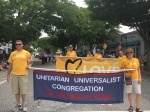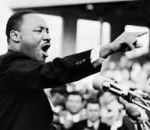
Today, in the near culmination of my long holiday weekend, I marched with my congregation in the local 4th of July Parade—an affair the organizers claim as the largest 4th of July parade on Long Island, since 1921. Because I knew this would be a part of my weekend, I began early posting about all the ways I would spend my time this weekend: an afternoon walking and wandering with visiting friends, a low-key party at the home of a British ex-pat congregant, a worship service elucidating the work of the UU UNO, an afternoon at the beach with friends, a day visiting 2 more beaches with friends, a fancy dinner, missed fireworks, another beach (we have lots of beaches out here), and one more attempt at fireworks. A fun time with good friends and a great congregation in a beautiful part of the world. And in the middle of it, marching in the 4th of July parade.
Having experienced this parade last year, I was tempted to beg off, under the guise of needing to care for my house-guests. This is on the list of nightmare scenarios: literally, parading myself through the streets of town drawing all kinds of attention; waving and smiling and well— you can imagine. But an earlier conversation with the member of the congregation organizing our participation in the parade reminded me how much our participation in the parade means to the people that I am blessed to serve with. So, bright and early this morning, I tossed the yellow rally cards into my car, filled my water bottle, and pulled on my golden “Standing on the Side of Love” T-shirt.
This holiday is a problematic one for me. I am not especially patriotic. Growing up, my father empowered us—through his example and his critique—to resist standing, hand over heart, to recite the pledge of allegiance and sing the Star Spangled Banner. That line in the pledge of allegiance—about liberty and justice for all—has mocked me since I was in middle school and old enough—educated enough—experienced enough—to know better. And The Star Spangled Banner cannot out-sing the discordance of its oft-ignored racist third verse. American patriotism—for me, and others like me—requires a suspension of disbelief. It requires us to strike a bargain of a kind of willful un-seeing and misremembering, in exchange for … what exactly?
Yet, as minister to this congregation, I march in the July 4 parade. Years ago, this congregation sued the parade organizers in order to be able to march with an anti-war banner. For them, the parade is an opportunity to show this community who they are and what they stand for. I do wonder, for the participants and the viewers alike: “What are you here for?” This year, there were 10 of us from the UUCSF: with yellow SOSL shirts, banner, & signs; and a red, white, and blue banner displaying the name of our congregation. Along the streets, as we ambled between a band float and an honor guard, the sidewalks were lined with people festooned in a remarkable sea of red, white and blue attire. Most were White, but there were plenty of Black and Brown faces waving flags, smiling and applauding us, taking pictures, giving a thumbs-up. I wonder, what are they there for?
In years past, I have celebrated this holiday with family, sometimes friends, enjoying a day off from work; an opportunity to tell stories and play games; to show off grilling and baking skills; an opportunity to be together. I recognized that in the parade goers today: an opportunity to be together; to cheer and to wave and to share good will. I sometimes preach about collective effervescence—these ritualistic opportunities for emotion to knit a community together around shared action and ideas. I recognize that, here too: people—families, friends, and neighbors—seeking an opportunity to be together— to be lifted toward something grander than the every day of living.
My continued hope is that in our reaching to be lifted to something grander, we do so from a foundation of truth and reckoning—honest remembering—of our history. My continued hope is that this kind of honesty lifts us out of an effete self-centered, self-flagellating mire of guilt and shame to a ground where we are able to hear and see each other honestly as we move to a more perfect union.
As my congregation gathered for the parade, we discussed that by this time next year, all of our literature and emblazoned bling will say something more inclusive than “standing” on the side of love. We considered ways that we might change our congregational mission statement to address this shift. For now, if you ask: Why we march in the 4th of July parade? (to our knowledge, the only congregation that does so), we will say that we are answering the call of love. We will say that we are proclaiming, to our friends and neighbors, the truth of a greater love—one that calls us to justice. We will say that we are inviting others to join us in that truth.
And so after the parade, I will put away my flags. I will go to the beach—again. I will listen to Frederick Douglass’s 165-year old address on “The Meaning of July Fourth for the Negro.” (full text) I will reflect upon the history of a nation that justified holding people in bondage—for profit, even as it proclaimed the self evident truth of all men [sic] created equal. I will contemplate the vestiges of this history, felt so keenly still today. And tomorrow, I will go to work reminded of Douglass’s words from another address:
If there is no struggle there is no progress. Those who profess to favor freedom and yet deprecate agitation are men [sic] who want crops without plowing up the ground; they want rain without thunder and lightning. They want the ocean without the awful roar of its many waters. This struggle may be a moral one, or it may be a physical one, and it may be both moral and physical, but it must be a struggle. Power concedes nothing without a demand. It never did and it never will. Find out just what any people will quietly submit to and you have found out the exact measure of injustice and wrong which will be imposed upon them, and these will continue till they are resisted with either words or blows, or with both.
I am here for truth. I am here for love and justice. I am here for the true liberation of all peoples.
